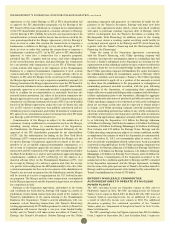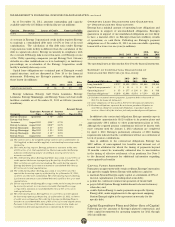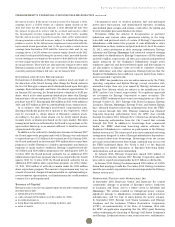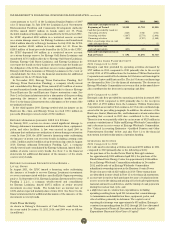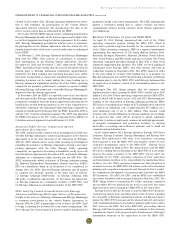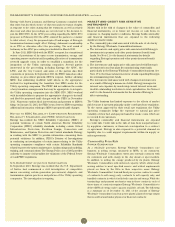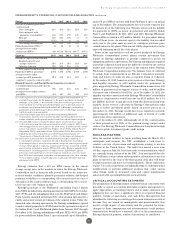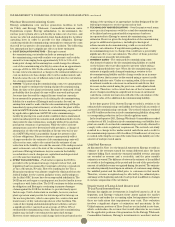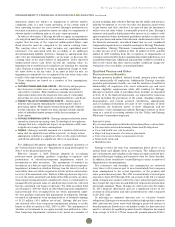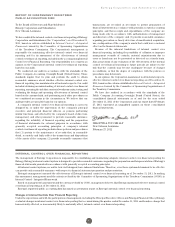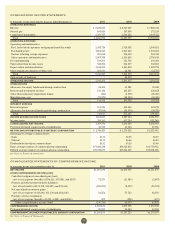Entergy 2011 Annual Report Download - page 48
Download and view the complete annual report
Please find page 48 of the 2011 Entergy annual report below. You can navigate through the pages in the report by either clicking on the pages listed below, or by using the keyword search tool below to find specific information within the annual report.
MANAGEMENT’S FINANCIAL DISCUSSION AND ANALYSIS continued
Federal Regulation
INDEPENDENT COORDINATOR OF TRANSMISSION
In 2000, the FERC issued an order encouraging utilities to voluntarily
place their transmission facilities under the control of independent
RTOs (regional transmission organizations). Delays in implementing
the FERC RTO order occurred due to a variety of reasons, including
the fact that utility companies, other stakeholders, and federal and
state regulators have had to work to resolve various issues related
to the establishment of such RTOs. In November 2006, the Utility
operating companies installed the Southwest Power Pool (SPP), a
regional transmission organization, as their Independent Coordinator
of Transmission (ICT). The installation does not transfer control of
Entergy’s transmission system to the ICT, but rather vests with the
ICT responsibility for:
n granting or denying transmission service on the Utility operating
companies’ transmission system.
n administering the Utility operating companies’ OASIS node for
purposes of processing and evaluating transmission service
requests and ensuring compliance with the Utility operating
companies’ obligation to post transmission-related information.
n developing a base plan for the Utility operating companies’
transmission system that will result in the ICT making the
determination on whether costs of transmission upgrades should
be rolled into the Utility operating companies’ transmission rates
or directly assigned to the customer requesting or causing an
upgrade to be constructed. This should result in a transmission
pricing structure that ensures that the Utility operating
companies’ retail native load customers are required to pay for
only those upgrades necessary to reliably and economically serve
their needs.
n serving as the reliability coordinator for the Entergy
transmission system.
n overseeing the operation of the weekly procurement
process (WPP).
n evaluating interconnection-related investments already made
on the Entergy System for purposes of determining the future
allocation of the uncredited portion of these investments,
pursuant to a detailed methodology. The ICT agreement also
clarifies the rights that customers receive when they fund a
supplemental upgrade.
The FERC, in conjunction with the APSC, the LPSC, the MPSC,
the PUCT, and the City Council, hosted a conference on June 24,
2009, to discuss the ICT arrangement and transmission access on
the Entergy transmission system. During the conference, several
issues were raised by regulators and market participants, including
the adequacy of the Utility operating companies’ capital investment
in the transmission system, the Utility operating companies’
compliance with the existing North American Electric Reliability
Corporation (NERC) reliability planning standards, the availability
of transmission service across the system, and whether the Utility
operating companies could have purchased lower cost power from
merchant generators located on the transmission system rather than
running their older generating facilities. On July 20, 2009, the Utility
operating companies filed comments with the FERC responding to
the issues raised during the conference. The comments explain that:
1) the Utility operating companies believe that the ICT arrangement
has fulfilled its objectives; 2) the Utility operating companies’
transmission planning practices comply with laws and regulations
regarding the planning and operation of the transmission system;
and 3) these planning practices have resulted in a system that meets
applicable reliability standards and is sufficiently robust to allow
the Utility operating companies both to substantially increase the
amount of transmission service available to third parties and to
make significant amounts of economic purchases from the wholesale
market for the benefit of the Utility operating companies’ retail
customers. The Utility operating companies also explain that, as with
other transmission systems, there are certain times during which
congestion occurs on the Utility operating companies’ transmission
system that limits the ability of the Utility operating companies as
well as other parties to fully utilize the generating resources that
have been granted transmission service. Additionally, the Utility
operating companies commit in their response to exploring and
working on potential reforms or alternatives for the ICT arrangement
that could take effect following the initial term. The Utility operating
companies’ comments also recognize that NERC is in the process of
amending certain of its transmission reliability planning standards
and that the amended standards, if approved by the FERC, will result
in more stringent transmission planning criteria being applicable in
the future. The FERC may also make other changes to transmission
reliability standards. These changes to the reliability standards
would result in increased capital expenditures by the Utility
operating companies.
The Entergy Regional State Committee (E-RSC), which is comprised
of representatives from all of the Utility operating companies’ retail
regulators, has been formed to consider several of these issues related
to Entergy’s transmission system. Among other things, the E-RSC in
concert with the FERC conducted a cost/benefit analysis comparing
the ICT arrangement to other transmission proposals, including
participation in a regional transmission organization.
In September 2010, as modified in October 2010, the Utility
operating companies filed a request for a two-year interim extension,
with certain modifications, of the ICT arrangement, which was
scheduled to expire on November 17, 2010. In November 2010 the
FERC issued an order accepting the Utility operating companies’
proposal to extend the ICT arrangement with SPP by an additional
term of two years, providing time for analysis of longer term
structures. In addition, in December 2010 the FERC issued an order
that granted the E-RSC additional authority over transmission
upgrades and cost allocation.
SYSTEM AGREEMENT
The FERC regulates wholesale rates (including Entergy Utility
intrasystem energy allocations pursuant to the System Agreement)
and interstate transmission of electricity, as well as rates for System
Energy’s sales of capacity and energy from Grand Gulf to Entergy
Arkansas, Entergy Louisiana, Entergy Mississippi, and Entergy New
Orleans pursuant to the Unit Power Sales Agreement. The Utility
operating companies historically have engaged in the coordinated
planning, construction, and operation of generating and bulk
transmission facilities under the terms of the System Agreement,
which is a rate schedule that has been approved by the FERC.
Certain of the Utility operating companies’ retail regulators and
other parties are pursuing litigation involving the System Agreement
at the FERC. The proceedings include challenges to the allocation
of costs as defined by the System Agreement and allegations of
imprudence by the Utility operating companies in their execution
of their obligations under the System Agreement. See Note 2 to the
financial statements for discussions of this litigation.
Entergy Arkansas and Entergy Mississippi Notices of
Termination of System Agreement Participation
Citing its concerns that the benefits of its continued participation
in the current form of the System Agreement have been seriously
46




